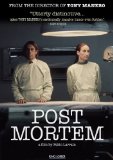| Reviews & Columns |
|
Reviews DVD TV on DVD Blu-ray 4K UHD International DVDs In Theaters Reviews by Studio Video Games Features Collector Series DVDs Easter Egg Database Interviews DVD Talk Radio Feature Articles Columns Anime Talk DVD Savant Horror DVDs The M.O.D. Squad Art House HD Talk Silent DVD
|
DVD Talk Forum |
|
|
| Resources |
|
DVD Price Search Customer Service #'s RCE Info Links |
|
Columns
|
|
|
Post Mortem
THE MOVIE:
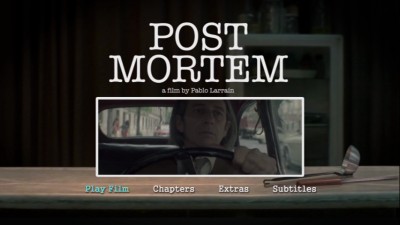
Set in Chile in the early 1970s, during a time of political upheaval, Post Mortem is a small story playing out against a larger backdrop. It's the tale of one man's personal struggles, his heroic impulses and his selfish humiliations, told as a series of lingering moments, largely unexplained, sometimes tricky to decipher. If you're not careful, the narrative structure will throw you. Writer/director Pablo Larraín (No) has tucked his ending into the early scenes with not much of a tip-off to what is happening. Time rolls backward imperceptibly, causing us to wonder if and how what we saw really happens.
Alfredo Castro, who also starred in Larraín's acclaimed Tony Manero, stars in Post Mortem as Mario, a transcriptionist at the hospital morgue. Mario watches as the doctor conducts his autopsies, and then types up all the details--or sometimes hires the neighbor kid to do it. The kid's older sister Nancy (Antonia Zegers) is a dancer in the local cabaret, and Mario is attracted to her. He watches her comings and goings silently from his yard. When he sees her in need of help, he comes to her aid, and a friendship and then a relationship of sorts forms. Nancy is also involved with Victor (Marcelo Alonso), a radical with ties to the Communist party. Victor is dismissive of Mario unless he needs something--a personality fault that will become important once the military crackdown begins.
The Chilean army steps in to quell any revolution. They take over Mario's workplace, and this part of the story takes over the final third of Post Mortem. As the shake-up begins, Larraín's movie, which was shot by Juan Cristóbal Meza (cameraman on Larraín's 2006 feature Fuga), starts to look like a post-apocalyptic film, complete with scenes of our ersatz hero wandering empty streets and maneuvering around rubble to get to the hospital. He has Nancy's wounded dog in tow, and he patches up the animal. When he takes the creature home, that's when he finds Nancy hiding out in the backyard shed. Her home has been trashed, her family is gone, though she feigns ignorance as to why. Mario keeps her secret safe, smuggling her supplies as he splits his time between home and work, where he is now under the charge of the military. There is a chilling scene where Mario's supervisor (Jaime Vadell) is forced to conduct an autopsy on an enemy of the state, despite the fact that the gunshot wound to the face pretty much speaks for itself. Tony is made to type up the proceedings, which he flubs. The whole scenario has shades of old crime movies and sequences with backwoods doctors being compelled to stitch up a bleeding gangster at gunpoint. It's doubly worrisome because we have reason to believe most of the hospital staff are sympathetic to the Communists based on earlier conversations around the breakroom table. Your level of tension as a viewer will be proportional to how strong your belief that Mario or any of his colleagues are essential.
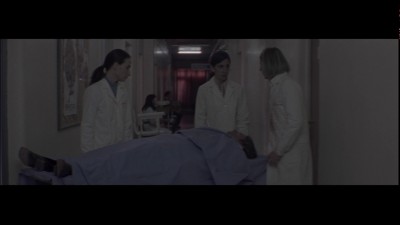
Larraín takes his time with his story. He likes to watch his sallow-faced star, who himself spends much of the movie's running time watching other things happen, not reacting, maintaining a constant state of loneliness and separation. Mario is an odd duck. He is always one step removed from whatever is going on. He is not the guy who inspects the bodies, but the one who takes the notes. His romantic delusions about Nancy offer him a few opportunities to assert himself, and though he doesn't get violent, per se, he is surprisingly aggressive. The pendulum swings all the way to the other side. This makes him a little scary, but it also allows for his later act of revenge to make sense. What the actor Alfredo keeps in reserve is how territorial Mario is. He has created his space, and he has a way of acting within it, and a violation of said space or code can and will be met with reprisal. It's a complex portrayal that inspires complex feelings. Fundamentally, Mario has the ability to rise to the occasion and be a hero; yet, when it's all said and done, we also react to how terribly he is used and don't necessarily root against the horrific measures he takes when he can't take anymore.
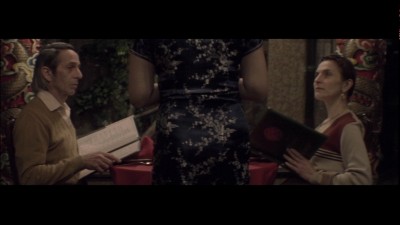
THE DVD
Video:
Post Mortem comes to DVD as a widescreen anamorphic transfer with a 2.66:1 aspect ratio. The film has a rigorously downbeat pallor, with lots of gray and brown, and mostly shot in low light. This makes for an intentionally anemic-looking motion picture, and so one that needs a restrained presentation. Kino Lorber does well maintaining the melancholy atmospheres, with what color there is being nicely modulated. Blacks are decent, and the resolution only suffers from minor softness.
Sound:
Though a quiet film, the producers don't skimp on the audio, giving us a thoughtful 5.1 Dolby Surround mix. Effects on the Spanish-language soundtrack are subtle, yet evocative, and there is nothing out of place. No distortion, hiss, or drop-outs were evident.
The English subtitles were easy to read and well written.
Extras:
Just a trailer and a stills gallery.
FINAL THOUGHTS:
Highly Recommended. Pablo Larraín's 2010 feature Post Mortem is an intriguing, sometimes perplexing film, a study of interior character juxtaposed against a tumultuous exterior. Alfredo Castro delivers a controlled performance as the film's lead, a transcriptionist in a morgue who finds his desire for love steamrolled by political revolution. In a way, the outsider becomes a player, but at the same time, realizes the game will never be for him. Full of languorous scenes and meaningful silences, Post Mortem demands viewer immersion. The movie isn't always forthcoming with the solutions to its riddles, but the impact of the final scene makes any extra effort worthwhile.
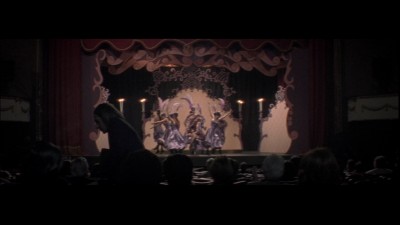
Jamie S. Rich is a novelist and comic book writer. He is best known for his collaborations with Joelle Jones, including the hardboiled crime comic book You Have Killed Me, the challenging romance 12 Reasons Why I Love Her, and the 2007 prose novel Have You Seen the Horizon Lately?, for which Jones did the cover. All three were published by Oni Press. His most recent projects include the futuristic romance A Boy and a Girl with Natalie Nourigat; Archer Coe and the Thousand Natural Shocks, a loopy crime tale drawn by Dan Christensen; and the horror miniseries Madame Frankenstein, a collaboration with Megan Levens. Follow Rich's blog at Confessions123.com.
|
| Popular Reviews |
| Sponsored Links |
|
|
| Sponsored Links |
|
|
| Release List | Reviews | Shop | Newsletter | Forum | DVD Giveaways | Blu-Ray | Advertise |
|
Copyright 2024 DVDTalk.com All Rights Reserved. Legal Info, Privacy Policy, Terms of Use,
Manage Preferences,
Your Privacy Choices | |||||||









